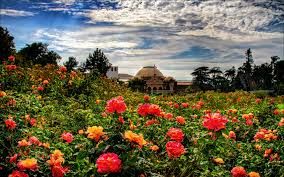Kishanlal - the gardener

I
The city’s whole waste was dumped at the wasteland in Bharnpur. The wastes were dumped on the left side of the by-pass road, leading to Raysonganj, a relatively lesser known district capital. By the side of the dump ground flew the city’s dirt canal, carrying all the waste.
II
Kishanlal had three sons, the third one Ram, a mentally retarded. He had a pet dog Tom, who knew always to obey his master. He worked as a Gardener in a central government institute that situated opposite his hut, thatched with pigeon pea stem, which was easily available in the area. During his service period, he maintained all the gardens in a very decent manner, trimming the bushes, pruning the roses, mowing the lawns, many bush trees cut into the shape of different animals; some of them in action, peacocks dancing in pair; elephants saluting, keeping their trunk high and waiving; lions as if to jump on their prey; cranes standing on one leg; mother holding a baby; giraffes keeping their long neck up eating leaves of trees; a monkey climbing up on a coconut tree etc. He loved all the plants in the garden alike.
During summer, he would take rest under the fruit yielding trees. It appeared to any one that a flower show was going on because one could see each plant blooming to its fullness, blossoming at its best. When the city’s famous rose garden wore a deserted look in extreme summer, gardens maintained by Kishanlal bloomed to its best, spreading fragrance of variety of flowers. He was, however, particular about one thing. He treated the flowers as if his children and would not allow anyone to pluck them even if they were to be offered to God in prayer. He held a novel belief that plucking flowers was equal to killing babies and that God would be happy to see the flowers on plants, smiling in full bloom irrespective of where they were. Denial of flowers for offering in prayers made him unacceptable to many so-called priests and old aged women. They took every opportunity to pluck flowers when he was not seen in the garden. This, indeed, pained him extremely.
III
It was Kishanlal’s retirement day. The institute where he worked decided to give him a befitting farewell. They arranged the farewell in the garden itself, which he had been maintaining for decades. It appeared that all the plants bloomed all its buds to its fullness for that particular day in gratitude of the love and care he had given them. It was really a very beautiful sight!
Everyone appreciated Kishanlal’s love for the garden and praised his work. During the Director’s address, he said that he was physically missing Kishanlal as an employee from the service, but his love could be seen always in the flowers that bloomed everyday in the campus. The Director asked him if he had any special request to make. Upon this, Kishanlal requested to allow him to have one sapling each of all the plants, if any time he needed it. The Director was only happy to grant him his request. As they were reaching the final leg of the farewell, one callous colleague presented him a white rose that he plucked from the garden then. Kishanlal looked at it, his heart almost broken to see that all the flowers withered at once.
He did not know how to express thanks to the audience. All that he said was a humble request - “Please do not pluck flowers even if it were to be offered to God, for God likes flowers as they are on plants”. To him, plucking a flower was equal to snatching a baby from its mother to be found buried in tomb later.
IV
Kishanlal’s retirement brought much happiness to his elder two sons and their wives. For a few day, they treated him nicely. When he received his retirement benefits including the amount on pension commutation, he divided the entire amount equally among his elder two sons. He did so because the previous night of his retirement day, he overheard his daughters’-in-law conspiring about getting rid of the old man with their husbands. He was first shocked to hear this. He could not sleep thinking about parting with the plants he loved most the next day. He took his third son Ram with him and left the house saying that they were going to Kashi. By doing so, he earned the respect of their sons and wives. He had, however, made up his mind never to return. He got Ram admitted in a house for the mentally retarded, assuring them of a regular monthly payment.
V
Kishanlal now had no place to live in. He, however, kept his love for plants deep in his heart. One day, he was walking through the by-pass road, leading to Raysonganj. He reached Bharnpur level cross. Many vehicles stood in line, waiting for the train to pass. He noticed that all the drivers were busy in shutting down the windows of their vehicles. The passengers were keeping their nose covered with handkerchiefs; some spraying perfumes on their body. He found municipal dustbin carriers dumping the waste in the nearby area. The foul smell emanated was so nauseous that healthy people stopped breathing for as much time as they could; the relatively weaker ones inhaling the foul smell as they had no other better option.
Kishanlal saw the plight of the people and took a decision. He brought one sapling each of all the variety of plants, which he was allowed to take by the then Director of his institute. There was no scarcity of water in that area as the dirt canal flew almost encircling the area of dumb-ground. At first, he planted branches of roses by the side of the canal. They grew fast as they received mud water, filled with manure. The meagre pension he received was not enough to support himself. But, he remitted the agreed upon payment to the home for the upkeep of his son, Ram. Whatever left out, he spent for purchase of new variety of plants. Thus, within a few months, the dump-ground turned out to be a beautiful garden, accommodating almost all species of plants and trees. Gradually the entire area started spreading fragrance of unique flowers. Birds of all species started flocking there, making one to feel as if it were a bird sanctuary. The surrounding area started fetching good price and many builders established housing colonies. When the residents had no park in the nearby area, they made a strong request to the local government to declare the waste-dumping area to a public park, which by then had already got converted to a unique garden. Owing to the pressure of public, for which they had to stage even many road-blocks, the government declared the area as a public garden, keeping a portion for dumping of waste. They assured the public that as soon as they found a new dumping area, they would stop dumping waste in the existing dump-ground.
Kishanlal was feeling happy seeing all these. He won the love of children in the area, whom he made soldiers of the garden. They closely kept a vigil on every old-aged women and so-called priests who came into the garden on the pretext of spending time. But their ill intension was better known to Kishanlal as he had many such experiences in the past. With much follow up, they got a law enacted for protection of public gardens. Every offender had to part with a heavy penalty which in turn was used for the upkeep and maintenance of the garden. Placards could be seen everywhere in the garden reading “I love flowers on the plants - God”.
This new method suggested by Kishanlal worked to a great extent. The number of offenders gradually got reduced; instead people themselves started contributing voluntarily for the maintenance of the garden.
VI
Shekhar, the new Collector of the city happened to visit the garden along with his family. Having taken stock of the situation and the dirt-canal that flew almost encircling the garden, he ordered for the establishment of water treatment plant to get rid of the dirt-water that flew in the canal. This proved very helpful. On the one side, otherwise unused waste, polluted water was treated for potable use, but it helped in raising the water level in the nearby area. The dirt canal, with full of different types of lotuses, was now filled with treated water, and one could see the stars peeing from the canal. The clouds that appeared in the water made one believe as if the sky has come down! The canal has now been got converted into a large lake as it had a vast catchment area, filled with clean water, with pedal boats. Even it helped in establishing fountains in many parts of the garden. Private companies competed to undertake the maintenance of these fountains. They installed computerized dancing light systems.
Shekhar belonged to peasant’s family. He ordered for the establishment of an advanced organic manure producing plant to produce organic manure out of the waste. This helped the farmers in the nearby region to use organic manure, which brought no harm to their agriculture land, plants but the yields started fetching higher rate in the market as no chemicals were used in its production. Shekhar also congratulated Kishanlal and appreciated his selfless love for the plants and trees. He admonished the public to draw inspiration from Kishanlal. He had a special praise for the Children’s Army.
VII
Shekhar informed about the park to the Governor. The Governor was very fond of gardens and believed that protection of environment meant protection of people besides keeping them happy and adding life span. He was so impressed to see the garden that he invited the President to pay a visit to the garden. The President was a great lover of flowers, especially roses, being a botanical scientist. The invitation of the Governor was accepted. Upon the arrival to the city, the President was accorded a grand welcome. He denied to accept bouquets and flowers as they were against his liking. He wanted to set himself an example for others. He asked all Collectors to ensure that such gardens came up in all big cities.
When the President came to know that it was all one single man’s dedication that made this beautiful garden, he wanted to felicitate Kishanlal. He was searched in all known places, but not to be found.
VIII
The next day, one of the drivers of the dust-bin carriers found Kishanlal dead in the new dust-bin ground, holding some cut branches of roses in his hands. Tom was weeping licking the face of his master, tears rolling down his eyes. The driver informed about the same to the Collector. The Collector felt so sad to see him dead there, but was feeling happy within - Kishanlal was continuing his self-less love for the plants. He ordered that Kishanlal be cremated there. The ashes were not taken to the holy rivers as per the wishes of Kishanlal scripted in a piece of paper found in his pocket, instead they were ploughed into the soil, where many cut branches were planted. After a few days, a dog looking like Tom was seen crushed under one of the dust-bin carriers. No one doubted it to be a case of suicide except....
IX
At Bharnpur, as the city grew, the railways sanctioned an over bridge. As per the original plan, submitted to them many years back, the over bridge would not have caused any inconvenience in that area. But by the time the plan was approved, a unique garden had come up in the dump-ground. Unrelenting resistance from children, supported by their parents and many NGOs foiled the plan and they had to approve another plan, which made them build the over bridge two kilometers away from the site proposed earlier.
X
The passengers passing through the area were rather feeling happy for having got pure, fresh air, filled with fragrance of all variety of flowers at least for a while. Even thousands of train commuters , who earlier used to shut the windows of the train as it approached Bharnpur, now kept the windows wide open as they approached Bharnpur so that they breathed pure fresh air, filled with unique fragrance of flowers they had never breathed before.
XI
Now-a-days, thousands of foreign tourists have started coming to visit this unique garden and their happiness unlimited to see birds having migrated all the way from their countries to a far away place called Bharnpur and not returning even after the season is over; some still whistling out sweet sounds; colourful as the rainbow, many parrots perching on the trees swinging, singing, swirling, chirping, twittering, hugging, and eating mangoes.
Like 0 Pin it 0


